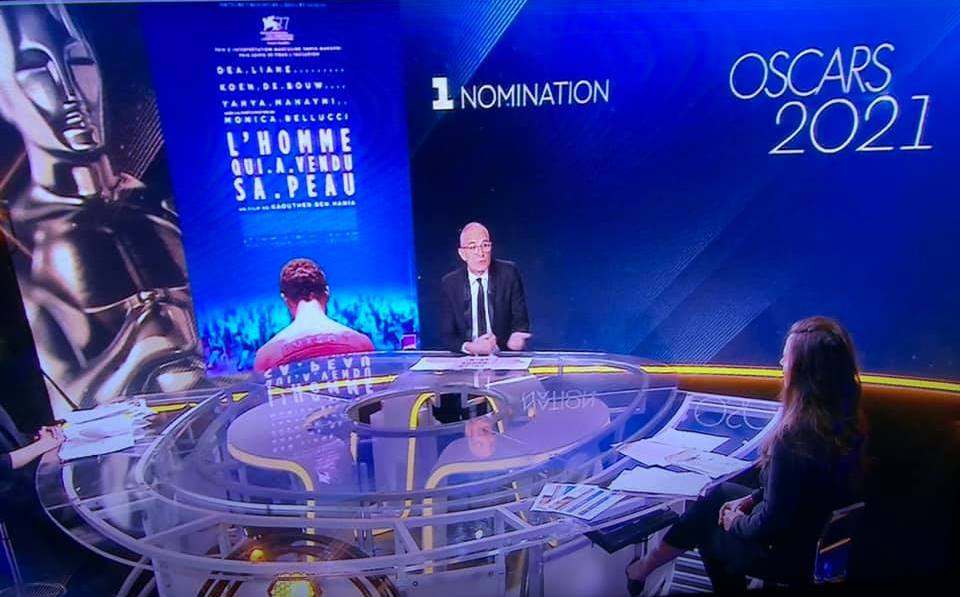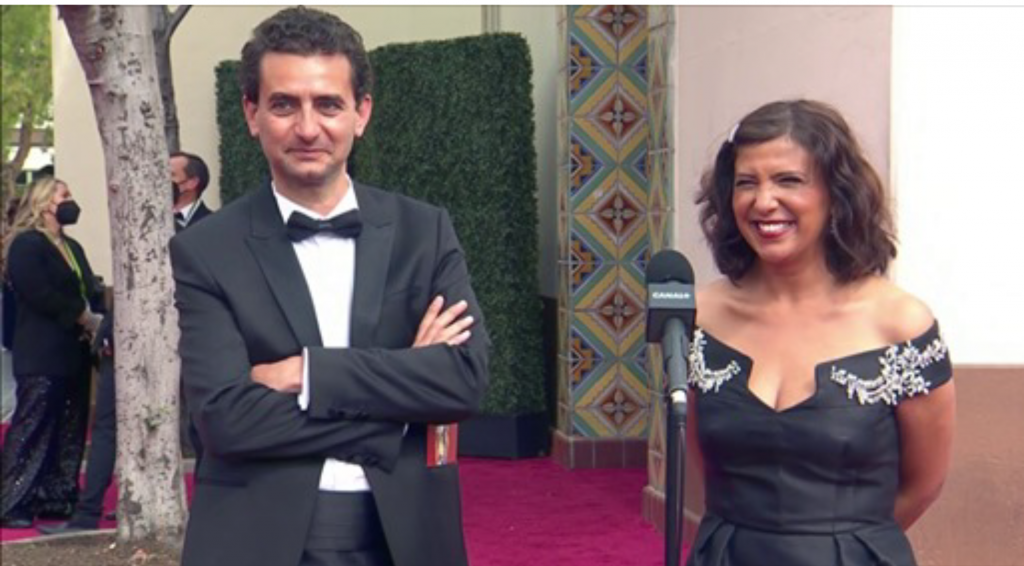“” We did not win but it was an incredible course! “Wrote producer Nadim Cheikhrouha, who accompanied Kaouther Ben Hania in Hollywood on his Facebook account for 93th Oscar ceremony, their film The man who sold his skin Being named for the Oscar for the best international film.
It is indeed the Danish film Drunk/Another Roundproduced by Thomas Vincterberg, who won this Oscar. This film, which had been part of the selection of the Cannes Film Festival in 2020, was also given favorite for several months.
We, Tunisians, are of course disappointed, but still happy. It is the first time in our story that a Tunisian film has been appointed to this Oscar. We had dreamed, hoped and felt pride. So much pride to see a Tunisian film as breathtaking and overwhelming arriving at the top!
Just before the start of the ceremony, Kaouther Ben Hania, who had offered this appointment to Tunisians and even to all of Africa had made a wish: Inchallah Marbouha!
But although The man who had sold his skin does not leave with the prestigious statuette, the appointment in itself is a victory and a glimmer of hope in a better future.
This appointment is not a surprise. Since his first screening at the Venice Festival, this film collects selections and awards and the various criticisms and cinema professionals cover it, as well as Kaouther Ben Hania his director, of praise.
This director, who is part of this new generation of Tunisian filmmakers who make miracles, is in herself a real juice. Since his first fiction feature film The Challat of Tunis (2013) which had been selected in the ACID section of the Cannes Film Festival, it flies from success to success, each film going even further than the previous one. She collects the fruits of a lot of work, but also of a certain talent. Especially since none of his films looks like the other. Each time, she manages to renew herself and surprise the spectators, by a new theme, but especially by a different writing and language.

This is the 7th time that Tunisia has submitted a film for the Oscar for the best international film (former Oscar for the best film in a foreign language):
- 1995 (68th) – The magicproduced by Azdine Melliti;
- 2002 (75th) – The magic boxproduced by Ridha Behi;
- 2016 (89th) – Barely open my eyesdirected by Leyla Bouzid, but the film was disqualified, Most likely because of the breeze due to the submission of two films. Tunisia first submitted the film Aleppo Fleur by Ridha Behi. This submission had then been canceled and replaced by Barely I open my eyes from Leïla Bouzid. Finally, neither of the two films had been selected and Tunisia disqualified for that year. Besides, the film Aleppo Fleur Not having been screened to the public, did not meet the submission criteria.
- 2017 (90th) – The Last of Us Directed by Ala Eddine Slim;
- 2018 (91st) – Beauty and pack Directed by Kaouther Ben Hania;
- 2019 (92nd) – Weldidirected by Mohamed Ben Attia;
- 2020 (93rd) – The man who sold his skindirected by Kaouther Ben Hania, which was the first Tunisian film to be appointed in this category.
Several other Arab films had also been appointed to the Oscar for the best international film, but, with the exception of the film Z From Costa Gavras, none had won the famous so coveted statuette.
- 1970-Z de Costa-Gavras (Algeria);
- 1984 – The ball D’Estore Scola (Algeria);
- 1996 – Lifetime from Rachid Bouchareb (Algeria);
- 2006 – Paradise Now by Hany Abu-Assad (Palestine);
- 2007 – Natives from Rachid Bouchareb (Algeria);
- 2011 – Outlaw from Rachid Bouchareb (Algeria);
- 2014 – Omar by Hany Abu-Assad (Palestine);
- 2015 – Timbuktu of Abderrahmane Sissako (Mauritania);
- 2016 – Theeb of Naji Abu Nowar (Jordan);
- 2017 – The insult by Ziad Doueiri (Lebanon);
- 2019 – Shambles from Nadine Labaki (Lebanon).
To date, Z was the only film representing an Arab country, Algeria, to have obtained the prestigious award. First great success of French director Costa-Gavras, Z had been shot in Algeria, where the production company of the Costa-Gavras film was based. But can we objectively say that Z Is an Algerian film, knowing that the film was neither written nor directed by Algerians? Besides, actors and technicians were not Algerian either. In fact, it’s just that the film had been shot in Algeria and had an Algerian co -producer.
Oscars 2021 – Producer Nadim Cheikhrouha and director Kaouther Ben Hania on the red carpet.
This 93rd Oscar ceremony is still historic for Tunisia, because it has allowed the whole world to discover our cinema and put the spotlight on a whole new generation of talented filmmakers who are reinventing Tunisian cinema.
After the 2011 revolution, freedom of expression benefited this sector a lot. There are no more taboos and all the subjects that are debated in Tunisia can be discussed, whether social, political or economic. These themes are treated with sincerity, daring, originality and total freedom of tone. What is lacking in other Arab countries, as in Egypt for example, which although it has a real film industry, sees its professionals forced in recent years to submit to the criteria of “clean cinema”, essentially imposed by society.
It is true that this freedom of your does not please everyone, and we very often read criticism and comments on social networks, of very unhappy Tunisians and denouncing Tunisian cinema, accusing him of not representing Tunisian society and its concerns and of being even on the verge of decency and morality.
These reproaches are not founded. First a work of art should never be judged or appreciated through a moralizing prism, but in addition Tunisian cinema reflects a real Tunisia, with its qualities and its faults and not an ideal and fantasized Tunisia as some imagine.
Fortunately, at least for the moment, these voices do not have enough influence and weight to silence the filmmakers. These continue to make authentic films, telling universal stories, while being local, as for example The very beautiful film A son From Mehdi Barsaoui, who although dealing with a universal theme, paternity, takes place in a very local setting and circumstances, after Tunisian revolution and the terrorist attacks that threaten the country.
In addition, while for many years, Tunisia produced one or two films per year, and sometimes even less, since 2011, at least a dozen films have been produced each year, diversified films (comedies, dramas, horror, documentaries …) and for all audiences: militant films, entertainment films, caricatures, reflections …
Tunisian cinema is also in the process of making a place on an international scale, with selected films and awarded in major film festivals like Venice, Cannes, Berlin, Toronto, Cairo, El Gouna … Both with fiction feature films as Barely I open my eyes (2015) by Leila Bouzid, Nhebek Hédi (2016) and Weldi (2018) by Mohamed Ben Attia, The Last of Us (2016) and Tlames (2019) by Alaa Eddine Slim, El Jaïda (2017) from Salma Baccar,, Noura Dream (2019) by Hinde Boujemaa,, A son (2019) by Mehdi Barsaoui and almost all the films of Kaouther Ben Hania, since The Challat of Tunis (2013) to The man who sold his skinthat with short films as And Romeo married Juliette (2014) by Hinde Boujemaa, Ghassra (2015) by Jamil Najjar, SHEIKH WETPLESS (2018) by Kaouther ben Hania or Broth (2019) by Meryam Jobeur who had also been appointed for the Oscar for best short film in 2020.
In addition, tributes are paid to our cinema and our filmmakers. Editions of certain film festivals are even dedicated to Tunisian cinema, such as 2019 editions Luxor’s African Film Festival (Egypt) and Malmö Arabic Cinema Festival (Suede). Moreover, In 2018, Tunisian producer Dorra Bouchoucha had been elected member of the very prestigious Academy of OscarsAnd In 2019, it was the turn of the Tunisian director Raja Amari to be elected member of the same academy. As such, they had the right to vote for the Oscar for the best international film. We bet they both voted for our Tunisian film !!!
Oscars 2021 – Kaouther ben Hania on the red carpet
This appointment to the Oscar for best international film is perhaps an opportunity to start working in Tunisia so that cinema in particular and culture in general, have the place they deserve.
No, culture is not only entertainment as our leaders say and as a large part of our fellow citizens believe, who do not have any awareness of what culture really represents, including economic. Yet Egyptian and Moroccan examples are quite significant. These two countries have been able to develop an important film industry, which makes hundreds of thousands of people work. Morocco has even become an almost essential land of filming, which also works its sector of tourism and crafts and generates very large currency revenues.
In recent years, it is the cinema that has shown the image of Tunisia around the globe, however it has the impression that it does not affect our rulers. For very long months, there is not even a Minister of Cultural Affairs!
Cinema has become today the best ambassador in Tunisia. He did for the country what the political class has failed to do. He made sure that we are talking about our country everywhere in glowing terms.
Will our rulers can capitalize on these successes? Will they finally understand all the benefits they could draw from it? Will they put the means that it takes? Will they increase the budget of the Ministry of Cultural Affairs? Will they be able to revise the obsolete laws that govern the sector? Will they be able to guarantee normal and even comfortable working conditions for our artists? Will they be able to simplify administrative procedures?
Unfortunately, with our current political class, nothing is less certain. Culture in no way being part of their concerns or their priorities. But thanks to our young and talented filmmakers, hope is really allowed.
The man who had sold his skin is currently projected in several cinemas in Tunis, Carthage, La Marsa, Bizerte, Menzel Bourguiba and Sousse. Go see him!
Neïla Driss
Read on the same subject:










